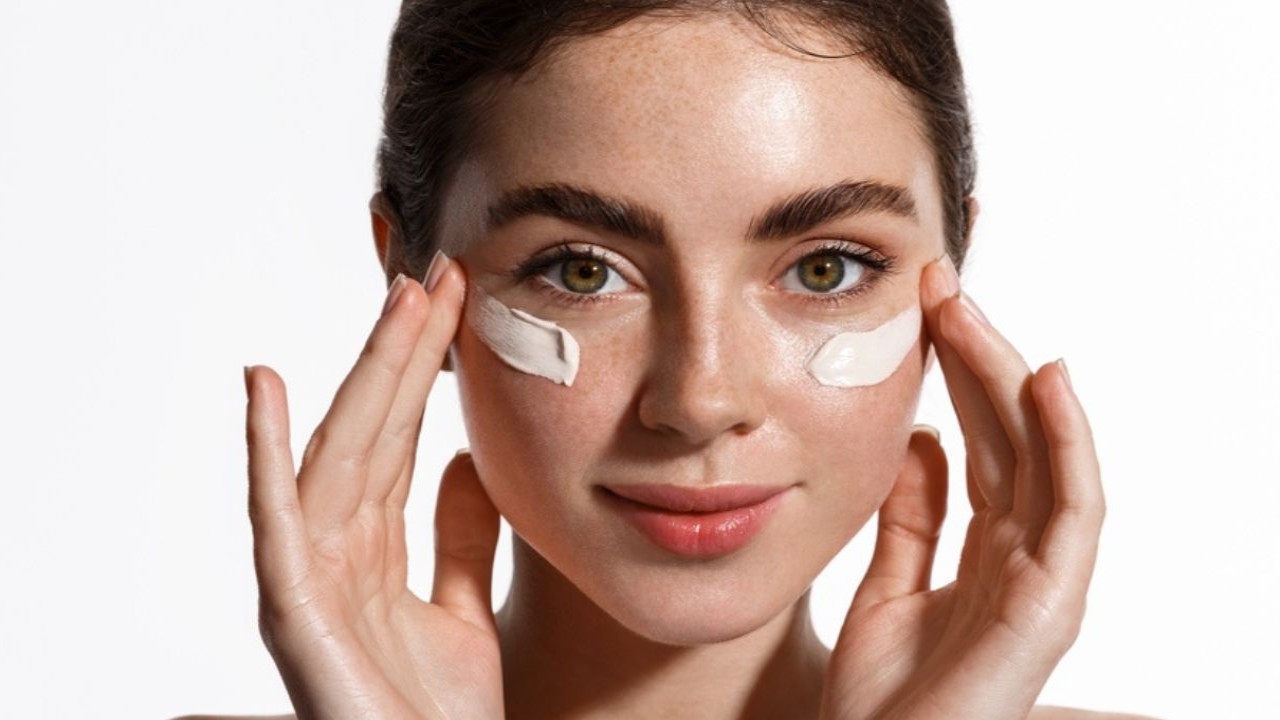Why Does Oily Skin Need a Moisturizer? Here’s All You Need to Know
Does oily skin need a moisturizer? This article answers this frequently-asked question with science-backed facts to help you understand and care for your skin.

Oily skin is characterized by a greasy feel, enlarged pores, and an icky appearance of shine. Due to their sticky and moist surfaces, such skin types have an increased vulnerability to environmental pollutants and are more prone to acne breakouts. Moreover, excess sebum production can cause dulling of one’s appearance, catalyze an unregulated microbial reproduction in the skin, and enhance the likeness of pore congestion, leading to blackheads, whiteheads, and pimples (1), (2).
Now, many people with oily skin are very cautious about their skincare routine and proceed very carefully to prevent worsening its condition. One such product that people with oily skin are often skeptical about using is a moisturizer. Before we learn whether it is appropriate to use a moisturizer for oily skin or not, let us understand a bit more about this skin type.
What Causes One’s Skin to Become Oily?

Oily skin is merely one’s skin’s tendency to produce excess oil, owing to the presence of sebaceous glands. While it is a common skin condition experienced by a large number of the global population, the causes behind the same remain difficult to explain with certainty, just like its dry skin counterpart. Skin experts continue to speculate genetic factors, hormonal conditions, weather conditions, exposure to heat and humidity, diet, etc. as possible factors for why some skin types are oilier than others. However, there are no confirmed claims for the same.
While one may understand the underlying causes of oily skin, it is extremely important to understand what it needs and the best ways to care for it. While moisturization is a primary and vital part of skincare in general, it is quite a dilemma for those with oilier skin types. This article intends to answer this question and elaborate on the same.
ALSO READ: How do I stop my face from being so oily?
Should People with Oily Skin Use a Moisturizer?

The short answer is yes. Many people with oily skin refrain from using a moisturizer as they do not wish to exacerbate the already present greasy film on the outer layer of their face. However, just because the skin looks and feels oily doesn’t mean that it doesn’t require a moisturizer.
When oily skin is dehydrated it may feel rather tight, dry, and uncomfortable, despite the greasy, shiny look such skin may have on the outside. And, when oily skin is signaled that it is dehydrated and requires moisture, it produces even more sebum to prevent it from getting parched, thereby disrupting the healthy skin microbiome and overall balance. This may further make the skin vulnerable to environmental pollutants, which can then be the cause of acne. To prevent this, moisturizing oily skin is essential.
While it may seem that the skin already has enough oil to moisturize its surface, what it truly lacks is sufficient water for a healthy skin microbiome (3). Hence, it is extremely important to use a moisturizer that caters to the specific needs of oily skin and delivers sufficient water without supplying it with more oil (4).
What Kind of Moisturizers Should People with Oily Skin Use?

Moisturization is the combination of the activities of three components — humectants, emollients, and occlusives.
Humectants are typically lightweight ingredients that supply water to the skin. A few examples of humectants include hyaluronic acid, panthenol, glycerin, aloe vera, and algae extracts.
Occlusives are the richest in consistency and help by sealing the skin’s moisture barrier to prevent water loss. Some examples include petroleum jelly, beeswax, and vegetable waxes, silicones, fatty acids, and alcohols such as Cetearyl alcohol, stearic acid, lanolin, etc.
Emollients consist of skin-pampering ingredients such as squalene, shea butter, plant-based oils, honey, etc. Such ingredients work by improving the skin’s texture and softness, thereby boosting overall skin health.
For an oily skin moisturizer, you should look for a product that contains a generous amount of humectants to draw moisture deep into the skin, as well as a small amount of occlusives to prevent trans-epidermal water loss. By using such a product, one can soothe and rejuvenate oily skin to make it feel less tight and dehydrated without causing breakouts. Let us further understand the benefits of moisturizing oily skin.
Benefits of Moisturization for Oily Skin

1. Helps Maintain a Healthy Oil Balance
A healthy balance of sebum and water in the skin boosts and maintains the health of its microbiome, which when compromised may lead to skin conditions such as psoriasis, dermatitis, and acne (5). As oily skin produces excess sebum compared to other skin types, moisturizing it with a humectant-rich formulation can significantly help maintain an overall oil balance.
2. Comforts the Skin
Trans-epidermal water loss in any skin type can cause discomfort and make the skin vulnerable to inflammation and severe dryness (6). In oily or combination skin, this can be marked by a feeling of tightness, while the skin continues to be greasy and sticky on the surface. In such a situation, the dehydrated skin itself signals that it needs moisturization. By using a suitable moisturizer, one can supply the skin with essential hydration, so that it feels comforted and rejuvenated.
3. Replenishes the Skin Barrier
The stratum corneum (commonly understood as the skin barrier) strengthens the skin and protects it from environmental damage, preventing skin problems such as dermatitis and inflammation (7). Moisturizing the skin not only alleviates dryness but also helps maintain healthy skin homeostasis, and oily skin is no exception to its benefits (8).
4. Improves Skin Texture
In addition to anecdotal evidence of people, research too, shows that hydration improves the skin’s texture (8). With regular and correct use of moisturizers, one can witness their skin getting significantly smoother and an overall improvement in its appearance.
5. Prevents And Helps with Breakouts
It is well-understood and widely experienced that oily skin is prone to acne breakouts, due to which people with oily and acne-prone skin avoid using a moisturizer for fear of exacerbating it. However, research shows that proper skin hydration has a profound effect on the reduction, prevention, and management of acne (9). Dr. Sravya C Tipirneni, Chief Consultant Dermatologist & Cosmetologist at Manipal Hospital, mentions, “Yes, moisturizing oily skin can help reduce excess shine! It might seem counterintuitive, but oily skin still needs hydration. A lightweight, oil-free moisturizer helps regulate sebum production and prevents your skin from overproducing oil to compensate for dryness.”
Now that we’ve understood why using a moisturizer is necessary for oily skin and the subsequent benefits of the same, let us scroll away to learn more about how to moisturize oily skin correctly to get the most out of it.
ALSO READ: EXCLUSIVE: A Dermatologist BREAKS the assumptions of oily skin and moisturisers
How to Hydrate Oily Skin Correctly?

1. Always Cleanse First
Cleansing the skin is the very first step you must consider before using any kind of skincare product — moisturizers included. Hence, you must always cleanse your oily skin using a good quality face wash, with equal importance given to both the face and the neck. Ensure that the cleanser you’re using isn’t too harsh and doesn’t strip your skin of its natural moisture, as that can make your skin produce more oil. Avoid sulfate-based face washes and opt for gentler water-based or oil-based cleansers.
2. Be Mindful of the Step in Which You Moisturize
If you wish to have a basic CMS (cleanser, moisturizer, sunscreen) skincare routine, then it is quite obvious at which step you need to moisturize the skin. However, if your daily skincare routine entails more products, such as serums, exfoliants, toners, sheet masks, essences, eye creams, etc., ensure that you apply those before moisturizing, and use sunscreen only after you’re done moisturizing for optimal results.
3. Be Mindful of the Quantity You Use
Now, while it is crucial to hydrate oily skin, it is also important to be mindful of how much moisturizer you’re using. You do not need more than a dime-sized amount to offer sufficient hydration for your face and neck. And, if your product has a more concentrated formula and a good spreading consistency, then a pea-sized amount works just fine.
4. Stick to a Product That Works for You
If you don’t know which moisturizer works best for your oily skin, then it is understandable that you may want to experiment for some time. However, exposing your skin to too many different formulations may cause side effects or reactions, which you must try to avoid. Hence, once you find a product that works for you, without causing any reactions, stick to it diligently.
5. Stick to a Proper AM/PM Routine
The ideal frequency of applying a moisturizer on any skin type, including oily skin would be twice a day — once in the morning and once at night before bedtime. The usage of moisturizer should be placed carefully with the other products in your skincare regimen (more on that below). Unless your skin really needs it, avoid re-applying the moisturizer very often, to maintain an optimal moisture balance in your skin.
While these points of correct hydration are appropriate for oily skin in general, people with oily and acne-prone skin should consider a couple more factors to help manage their acne problems without aggravating the condition.
Factors to Consider When Moisturizing Oily Skin with Acne

1. Select the Moisturizer Carefully:
For oily, acne-prone skin, the moisturizer you choose must be explicitly labeled as non-comedogenic, which means that the product won’t clog the pores in your skin or trigger any blemishes as a consequence. A non-comedogenic moisturizer would essentially be free of harsh ingredients such as lanolin, phthalates, cocoa butter, petroleum jelly, fragrances, rich oils, or heavy occlusives as they can be a cause of pimples. Also, it should be a lightweight moisturizer that absorbs easily into the skin. Avoid products with too many ingredients if they particularly appear suspicious to you.
2. Couple the Hydration with Proper Exfoliation And Acne Treatment
While a simple CMS skincare regimen may suffice for those with relatively normal skin types with no underlying conditions to treat, acne-prone skin definitely requires skincare products that help treat it, in addition to a moisturizer. Exfoliation with salicylic acid or alpha-hydroxy acids such as azelaic acid is highly recommended as they help decongest skin’s pores, eliminate dead skin cells, maintain an oil balance, and reduce inflammations to treat acne lesions (10), (11).
In case of more severe acne, you can resort to active ingredients such as benzoyl peroxide, antibiotics, and retinoids (tretinoin or adapalene). Moisturizing the skin becomes all the more crucial when using such products to support the skin and help it restore.
3. Avoid Over-moisturizing the Skin
Excessive moisturization may have adverse effects on acne, as it may compromise the skin’s natural ability to regulate itself. Hence, it is important to moisturize optimally, without using the product too much or too often.
How to Select the Right Moisturizer for Oily Skin?

For optimal oily skin care, it is paramount to invest in a moisturizer that caters to its specific needs. After all, several misconceptions about moisturizing oily skin persist because people continue using products that are not meant for the skin type. The following factors will help you invest in the right product, thereby offering the best for your skin.
1. Look for Products That Are Oil-free: Moisturizers for oily skin should non-negligibly be oil-free and non-comedogenic. This would ensure that the product doesn’t add to an oil build-up on your skin. They should be rich in water and humectants and contain a small quantity of lightweight occlusives to seal the nourishment in your skin.
2. Consider Their Consistency, Texture, And Overall Formulation
Oily skin moisturizers should also be lightweight and fast-absorbing, otherwise, they would simply form a film on the surface of your skin without offering any real hydration benefits, perhaps even leading to whiteheads and pimples. Water-based or gel-based formulas should be hence prioritized over rich and heavy creams.
3. Look for Specific Ingredients
Niacinamide is an excellent ingredient to look for in a moisturizer for oily and acne-prone skin. This is because niacinamide helps regulate excess sebum production and maintains an oil balance in the skin while also showing positive effects on acne reduction (2), (13). Moreover, the inclusion of anti-inflammatory ingredients in the moisturizer, such as green tea or Centella Asiatica may show excellent results in calming acne flare-ups (13), (14).
Dimethicone is an excellent ingredient to look for in oil-free moisturizers for its occlusive and emollient properties, as it is hypoallergenic, doesn’t clog pores, and reduces trans-epidermal water loss without making the skin look or feel greasy (15). Other excellent ingredients include glycerin, aloe vera, ginkgo biloba, allantoin, and witch hazel extracts.
Conclusion
Does oily skin need a moisturizer? It certainly does! While topical hydration is extremely crucial for oily skin, like any other skin type, it is also important to invest in the right product, use it appropriately, and follow a proper skincare routine when doing so. Apart from the above-discussed science-backed benefits, moisturization helps rejuvenate the skin, makes it feel more comforted, and imparts a natural glow and youthfulness — and oily skin should not be deprived of it because of its greasy composition.
Optimal hydration will help strengthen oil skin, as well as protect oily skin from environmental pollutants and makeup. Understanding which product works for you calls for some trial and error, so be patient and mindful during the process. And once you find a product that doesn’t seem to cause any irritation, then commit to it for 2-3 months to get to a verdict.





 JOIN OUR WHATSAPP CHANNEL
JOIN OUR WHATSAPP CHANNEL














































